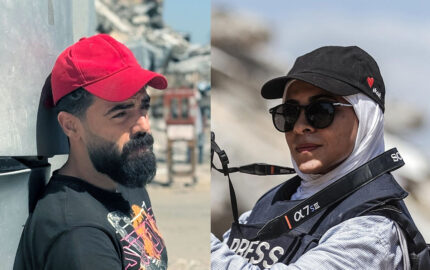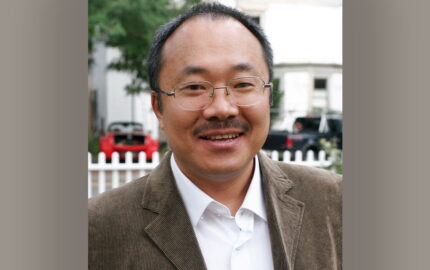(May 31, 2005) Mark Kramer, director of the Nieman Foundation Program on Narrative Journalism at Harvard University, was the keynote speaker at South Africa's first narrative journalism conference.
Wits University Journalism Programme and the SA Nieman Fellowship co-hosted the Narrative Journalism Conference on June 13 and 14 at the Bozzoli Hall on Wits' main campus in Johannesburg. The conference was opened by Wits Vice Chancellor Loyiso Nongxa.
The annual Nieman Narrative Journalism Conference in the United States (co-hosted by the Poynter Institute and The Boston Globe) is attended by a thousand midcareer journalists from around the globe each year.
The South African conference offered senior reporters and editors a forum for critical thinking, debate and learning about narrative journalism. It inaugurates a series of annual conferences seeking to hone the craft of journalism.
Kramer said increasing interest in narrative journalism favours readers and writers. "Editorial interest in narrative is up as news media search for remedies to widespread current business problems, declining or stagnant newspaper circulation, aging readership and decreased minutes spent reading papers.
"Narrative is on the remedy list because it engages readers. In this age of mega-corporate media saturation, Web sites and workaholism, readers still savor stories in which people's lives and decision-making are vividly portrayed.
"Newspapers have tried shorter, zestier pieces, color printing, more reader services such as listings. But narrative alone moves newspapers toward deeper coverage, toward fulfillment of the civic mission that distinguishes our worthy profession. This distinction makes narrative journalism of special interest to many editors and reporters, even as it raises questions about the skills and roles of reporters and editors who might try it out."
Kramer presented two sessions at the conference: one about the history, practice and resistance to news narrative and a second on how good narrative gets reported, written and presented. The focus of the Narrative Journalism Conference was to tackle how-to issues and also such practical matters as space and time constraints.
"Almost any news story can benefit from a morsel of narrative, because sensory reports engage readers, drawing them into the pleasurable illusion of immediacy," Kramer said. "And narrative also opens direct ways of reporting the revealing, nuanced lives of not just the prominent, but of ordinary citizens. Dull but crucial stories can be invigorated."
Other speakers at the conference included author Susan E. Eaton and Nieman Fellows such as SABC head of radio Pippa Green, South African National Editors Forum head Joe Thloloe, City Press Editor Mathatha Tsedu and Rapport Editor Tim du Plessis.
The conference was made possible by Total SA, Johncom, Independent Newspapers, the Mail and Guardian, Kaiser Family Foundation and the American Embassy.
For more information about the conference, contact Mammuso Makhanya at 083-658-0469 or Debby Kramer 082-926-7916/ 011-888-3542. For more information on narrative journalism, go to www.nieman.harvard.edu/narrative
Issued on behalf of
Wits University Journalism Programme
Professor Anton Harber
Caxton Professor of Journalism
Nieman Fellowship of Southern Africa
Charlotte Bauer
Wits University Journalism Programme and the SA Nieman Fellowship co-hosted the Narrative Journalism Conference on June 13 and 14 at the Bozzoli Hall on Wits' main campus in Johannesburg. The conference was opened by Wits Vice Chancellor Loyiso Nongxa.
The annual Nieman Narrative Journalism Conference in the United States (co-hosted by the Poynter Institute and The Boston Globe) is attended by a thousand midcareer journalists from around the globe each year.
The South African conference offered senior reporters and editors a forum for critical thinking, debate and learning about narrative journalism. It inaugurates a series of annual conferences seeking to hone the craft of journalism.
Kramer said increasing interest in narrative journalism favours readers and writers. "Editorial interest in narrative is up as news media search for remedies to widespread current business problems, declining or stagnant newspaper circulation, aging readership and decreased minutes spent reading papers.
"Narrative is on the remedy list because it engages readers. In this age of mega-corporate media saturation, Web sites and workaholism, readers still savor stories in which people's lives and decision-making are vividly portrayed.
"Newspapers have tried shorter, zestier pieces, color printing, more reader services such as listings. But narrative alone moves newspapers toward deeper coverage, toward fulfillment of the civic mission that distinguishes our worthy profession. This distinction makes narrative journalism of special interest to many editors and reporters, even as it raises questions about the skills and roles of reporters and editors who might try it out."
Kramer presented two sessions at the conference: one about the history, practice and resistance to news narrative and a second on how good narrative gets reported, written and presented. The focus of the Narrative Journalism Conference was to tackle how-to issues and also such practical matters as space and time constraints.
"Almost any news story can benefit from a morsel of narrative, because sensory reports engage readers, drawing them into the pleasurable illusion of immediacy," Kramer said. "And narrative also opens direct ways of reporting the revealing, nuanced lives of not just the prominent, but of ordinary citizens. Dull but crucial stories can be invigorated."
Other speakers at the conference included author Susan E. Eaton and Nieman Fellows such as SABC head of radio Pippa Green, South African National Editors Forum head Joe Thloloe, City Press Editor Mathatha Tsedu and Rapport Editor Tim du Plessis.
The conference was made possible by Total SA, Johncom, Independent Newspapers, the Mail and Guardian, Kaiser Family Foundation and the American Embassy.
For more information about the conference, contact Mammuso Makhanya at 083-658-0469 or Debby Kramer 082-926-7916/ 011-888-3542. For more information on narrative journalism, go to www.nieman.harvard.edu/narrative
Issued on behalf of
Wits University Journalism Programme
Professor Anton Harber
Caxton Professor of Journalism
Nieman Fellowship of Southern Africa
Charlotte Bauer


